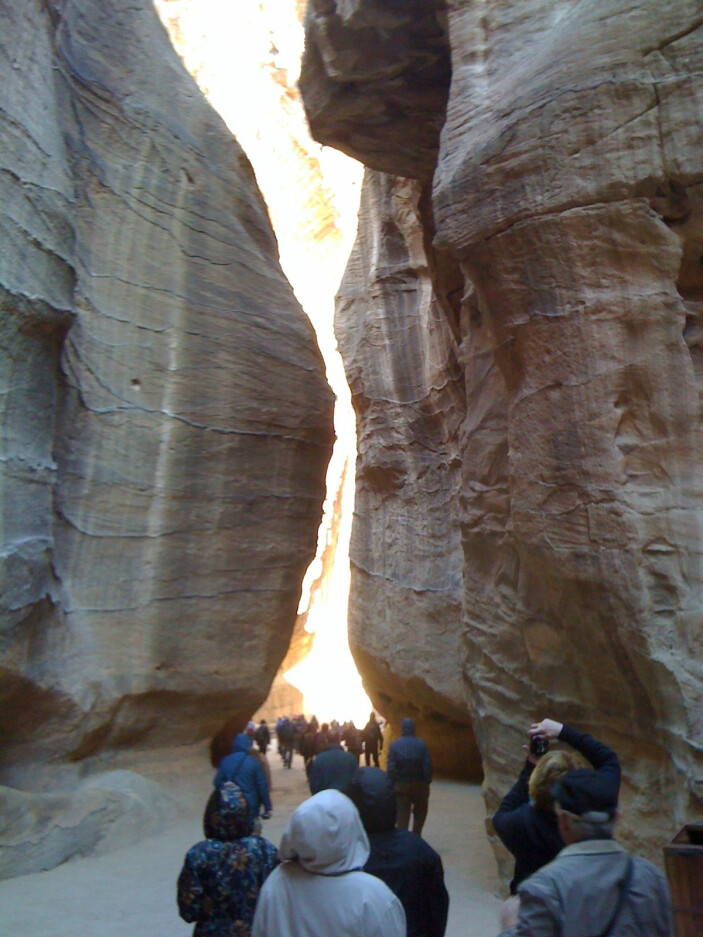“The day of the Lord is near
for all nations.
As you have done, it will be done to you;
your deeds will return upon your own head.
Just as you drank on my holy hill,
so all the nations will drink continually;
they will drink and drink
and be as if they had never been.
But on Mount Zion will be deliverance;
it will be holy,
and Jacob will possess his inheritance.
(Obadiah 1:15-17, NIV)
One of my favorite places I have visited in my tours of Israel is Petra. Prior to a side trip to Petra once, I had long looked forward to seeing one of the wonders of the world, especially the Al Khazneh treasury, which most recognize from Indiana Jones and the Last Crusade. More importantly, I was eager to see the setting of Obadiah’s prophecy.
Obadiah prophesied against Israel’s perpetual neighbor, Edom, that someday the Lord would bring her down despite the security of her fortress. The Edomites who lived in the “clefts of the rocks” of Petra were proud of their “home in the heights,” but God assured, “from there I will bring you down.”
The Edomites settled Petra about 1200 B.C. Little is known about the transition from the Edomites to the Nabateans who developed the magnificent facades for which Petra is famous today. Some think the Nabateans migrated into Edom about 300 B.C. and gradually replaced the ancient Edomites. Regardless, they developed the breathtaking temples, theatres, and tombs and maintained their stronghold until the mid-60s B.C.
The primary strategic strength of the city is in a narrow passageway called a siq, which winds for about two miles. The entrance is so narrow at points that only a couple of horses could pass through. On either side are sheer cliff walls rising hundreds of feet. The siq could be defended by a handful of soldiers. And even if the city was penetrated, the defenders could retreat to the desert.
Eventually, the Roman general, Pompey, figured out a way to bring the Nabatean kingdom down without shedding any blood. He discovered Petra’s secret water source and cut it off.

Shortly after we toured Petra, Professor Bob Vasholz, a retired professor from Covenant Seminary and dear friend, gave a devotional to our tour group from Obadiah. Dr. Vasholz had one particularly penetrating insight that was most encouraging to me.
Obadiah’s prophecy is that God will cause his Kingdom to spread to all those places where man says it is not allowed: “The day of the Lord is for all nations . . . But on Mount Zion will be deliverance” (vv. 15, 17). Dr. Vasholz then read from a Lutheran commentator named Theodore Laetsch who argued that the Bible gradually records the progress of the Gospel into all the cities Obadiah names:
When and how were promises of ob. 19,20 fulfilled? The Lord himself has indicated the time as well as the manner of fulfillment. As long as the old covenant continued, he had promised a return to repentant Israel (Dt. 30:1-5). In this regard the Lord kept his promise (cf. Ezra 1:1-5). Yet already Balaam had prophesied that Edom was to be a possession for his enemies in the time of the Messiah (Num. 24:17,18). Amos reveals that the restored hut of David would possess the remnant of Edom, namely, all which are called by the Lord’s name (Amos 9:11,12). James applied this prophecy to the church’s victorious conquest of all the Gentiles by the preaching of the gospel. Matthew and Mark tell us that people from Jerusalem, Judea, Galilee, from beyond Jordan, Decapolis, Idumaea, Tyre and Sidon were gained for Christ’s kingdom by Christ’s preaching. The book of Acts records the fulfillment of Obad. 17-20; the conquest of the countries and districts named by Obadiah by the church of the New Testament, the true Mt. Zion: Philistia (Ob. 19), Acts 8:40; 9:32-43; Samaria (v. 19), Acts 8:5-17; Zarephath in Phoenicia (v. 20), Acts 11:19; Sepharad (v.20), in Asia Minor, rev 3:1, and Paul’s evangelism. Paul was a Benjamite and Benjamite is named as possessing Gilead, at Paul’s time having a mixed population of Jews and Gentiles, representative of conditions under which Paul labored in the world at large.
This intermediate fulfillment of Obadiah’s prophecy is a foreshadowing of God’s ultimate promise to set up the Kingdom of his Christ over all the earth. When Jesus came to earth and was born in a seemingly unimportant place like Bethlehem, he proved at least two things. For one, he proved that God is committed to redeeming his creation. He also proved that this commitment extends to every square inch of creation. No place is beyond the redeeming power of Christ.
What does this mean for us? It means that as we pray, “your will be done, on earth as it is in heaven,” and go about our small part in that work, we have assurance that God is answering, and will one day finally answer in full, that prayer.
No matter how important or unimportant, grand or small, noticed or forgotten, fruitful or barren, receptive or closed off the place you are working to bring God’s kingdom may be, you may be assured that a day is coming when it shall be said, “The kingdom of the world has become the kingdom of our Lord and of his Christ, and he shall reign forever and ever” (Rev. 11:15).
No part of creation is outside the redeeming reach of our Lord Jesus Christ and he has dignified you to play a part in bringing that redemption.
